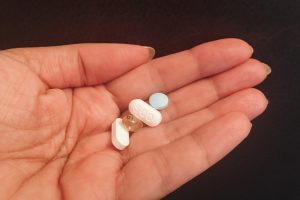Nitrofurantoin is a popular antibiotic usually prescribed to treat lower urinary tract infections because of its mechanism of action. This drug is highly effective against most gram-positive and gram-negative organisms and can also be used to prevent urinary tract diseases. Nitrofurantoin is also referred to as Macrobid and is considered generally safe. However, some interactions or side effects may occur for some patients. Patients sometimes ask, ‘Can you drink on nitrofurantoin?’
Even though this medication is considered safe, some unwanted interactions may occur when taken with alcohol. This article discusses the possible effects of mixing nitrofurantoin with alcohol and provides answers to some of the frequently asked questions about this medication.
What is nitrofurantoin used for?
Nitrofurantoin is an antibiotic that specializes in fighting bacteria in the urinary tract, providing effective treatment for urinary and bladder infections.
The medication is available in tablet or capsule form and is taken orally.
The drug’s mechanism of action makes it highly effective against bacteria in the lower urinary tract, including UTIs, cystitis, and bladder infections.
Nitrofurantoin is available with the brand names Aratoin, Furadantin, Macrobid, and Macrodantin.
How does nitrofurantoin work?
Nitrofurantoin is an antibiotic that is effective against uncomplicated lower urinary tract infections because of how it works.
Nitrofurantoin works uniquely from other antibiotics because the medication is typically filtered from the blood into the bladder.
Once concentrated in the bladder, the drug eliminates bacteria such as E. coli and Staphylococci, relieving UTI symptoms.
It is crucial to highlight nitrofurantoin’s mechanism of action and its effectiveness against uncomplicated lower UTIs.
Mechanism of action
Once used, the medication is quickly filtered out of the blood and into the urine, thus delivering the drug’s antibiotic qualities to the site of the infection.
When nitrofurantoin contacts the bacteria in the bladder, it destroys the bacteria cells. It eliminates their genetic material, disrupting the growth and leading to the eventual death of bacteria in the bladder.
After nitrofurantoin is taken orally, the medication goes into the bloodstream.
The medication is then discharged into the urine after the kidneys extract it from the blood.
The bacteria absorb nitrofurantoin in the urinary system before the medication damages the bacteria’s biological functions.
Nitrofurantoin disrupts the genetic formation of the bacteria and causes them to stop synthesizing protein.
Bacteria cells require proteins for structure and DNA for reproduction and development.
Nitrofurantoin is effective against bacteria in the bladder because it prevents the bacteria from developing and reproducing, thus leading to elimination.
Can you drink on nitrofurantoin?
Nitrofurantoin is considered a safe drug as it doesn’t often cause severe side effects. This medication is famous for its mild adverse effects on patients.
Can you drink on nitrofurantoin? Despite its mildness, mixing alcohol and nitrofurantoin is not a good idea.
Nitrofurantoin and alcohol do not have any specific interactions or severe side effects when combined.
Moderate drinking while on this medication has shown no adverse impact on patients. However, drinking a lot of alcohol while on nitrofurantoin may cause unwanted complications and severe health problems.
In addition, excessive alcohol intake can reduce the efficacy of the medication. In addition, substance abuse is not advised. Patients with a history of alcohol abuse should speak to their doctors before using nitrofurantoin.
Excessive alcohol consumption is detrimental to patient health. people who drink excessively can visit an alcohol addiction treatment center for professional help. Excessive alcohol intake can impact mental health negatively
Suppose you plan to drink while on nitrofurantoin. It would be best to inform your doctor to avoid unwanted health complications.
In addition, patients using nitrofurantoin for bladder or UTI treatment shouldn’t drink alcohol.
Alcohol can aggravate the infection, reducing the efficacy of the medication and prolonging recovery time.
Another reason to stay away from drinking when on this medication is alcohol may prevent patients from noticing any adverse effects.
It is crucial to remain alert for changes in the body when on nitrofurantoin. Ensure to speak to your doctor before drinking on medication.
Nitrofurantoin warnings
Suppose you plan to use nitrofurantoin for UTI treatment. There are crucial warnings to note.
Nitrofurantoin can cause symptoms like rash or itching, indicating an allergic reaction.
Doctors have related long-term use of this medication to lung damage, especially in older adults. Symptoms like breathing difficulty and persistent cough should be reported to the doctor immediately.
Symptoms like yellowing of the skin or eyes and abdominal pain can indicate liver damage.
Numbness or tingling can indicate nerve damage, even though this is rare. Patients with kidney infections are particularly susceptible to this condition.
Nitrofurantoin can also cause diarrhea and nausea and distort the natural balance of the gut flora, leading to candidiasis or bacterial vaginosis.
Pregnant patients are advised to use this medication with care and as recommended by a qualified medical expert, especially while breastfeeding or close to term.
Nitrofurantoin side effects
Like every other antibiotic, nitrofurantoin has a range of side effects. These side effects are typically mild compared to other medications.
Understanding these adverse reactions is essential for patients and healthcare professionals to recognize and manage potential risks that may arise.
Some of the common side effects include:
- Change in urine color
- Gastrointestinal problems
- Loss of appetite
Read also: Nitrofurantoin Dosage for UTI
Nitrofurantoin drug interactions and side effects
Macrobid/nitrofurantoin is considered a relatively safe medication compared to other antibiotic alternatives. For example, trimethoprim-sulfamethoxazole and ciprofloxacin have more recorded adverse effects than nitrofurantoin.
Common reactions
The most common adverse reactions to nitrofurantoin are loss of appetite, vomiting, and diarrhea.
These are pretty mild reactions that usually occur within the first week of using the medication.
Sometimes, patients can get severe side effects from using nitrofurantoin. One of the more renowned side effects is pulmonary toxicity, which can be classed into acute, subacute, and chronic pulmonary reactions.
Severe adverse reactions
Sudden emergence of fever, chills, cough, myalgia, and dyspnea may indicate an acute pulmonary reaction to nitrofurantoin, while persistent dry cough, dyspnea, and fever may indicate a sub-acute reaction.
The occurrence of persistent dry cough and dyspnea usually indicates chronic pulmonary reaction.
Speak to your doctor immediately if you notice these symptoms. Immediate cessation of nitrofurantoin use can reverse the toxicity.
This side effect of the medication remains rare, with the percentage of cases estimated to be 0.001% of nitrofurantoin treatments.
Nitrofurantoin can also cause liver failure, which can be fatal. In addition, this medication can increase a patient’s blood pressure.
This is why informing your doctor of any existing health conditions before taking any medication is essential. Suppose you notice these symptoms.
You should immediately cease using the drug and call your doctor.
Complete recovery is expected over an extended period after cessation of the medication.
How to use nitrofurantoin
Nitrofurantoin is only available as an oral drug in capsule or tablet form.
Current Infectious Disease Society of America data recommends this medication as a first-line antibiotic for uncomplicated UTIs.
The optimal dosing of the medication is mainly unknown. However, doctors typically prescribe a 5 or 7-day course to treat lower UTIs.

Nitrofurantoin dosage
Speaking to a qualified healthcare provider before using nitrofurantoin for your infection is essential.
Your doctor will consider other medications you’re taking and your medical history before recommending an antibiotic to avoid unwanted complications or contraindications.
Doctors typically prescribe 100 mg twice daily for five days to treat lower UTIs. Depending on the severity of the infection, a 7-day course of 100 mg used twice daily is also recommended.
It is vital to note that using this medication for less than five days is less effective and not advised. To prevent UTIs, doctors recommend 50-100 mg to be used once a day at night.
Nitrofurantoin and antibiotic resistance
Several studies have shown that nitrofurantoin is an excellent prophylactic medication compared to other antibiotics.
This is because resistance to nitrofurantoin remains relatively uncommon even though the medication has been approved for widespread use for several decades.
Nitrofurantoin and UTIs
The FDA approved the use of nitrofurantoin for lower UTI treatment in 1953.
This medication is a synthetic antimicrobial made from a combination of furan, a nitro group, and a side change of hydantoin.
Antibiotic-resistance
Nitrofurantoin was popularly used to treat lower UTIs until trimethoprim-sulfamethoxazole and newer beta-lactam antibiotics became available in the 1970s.
Recently, numerous major guidelines have indicated nitrofurantoin as a first-line therapy for uncomplicated lower UTIs because of the increasing resurgence of extended-spectrum beta-lactamase (ESBL) producing bacteria.
Nitrofurantoin is an optimal treatment for UTIs because after it is filtered from the blood into the urine, its concentration can focus on eliminating the bacteria in the bladder without disrupting bowel flora.
This medication is also highly regarded as a prevention aid against UTIs due to its low probability of antibiotic resistance over a long period of use.
Nitrofurantoin research for UTIs
Researchers suggest nitrofurantoin’s continued efficacy against UTIs and low resistance patterns partly because of its minimal reaction on bowel flora.
Bacteria that nitrofurantoin treat
This medication is effective against bacteria, including Escherichia coli, Enterococci, Klebsiella, Staphylococcus saprophyticus, and Enterobacter.
It also works against Shigella, Salmonella, Citrobacter, Neisseria, Bacteroides, group B streptococcus, Staphylococcus aureus, and Staphylococcus epidermidis.
When to see a doctor
Keeping your doctor abreast of your health situation is essential.
Before using any medication, you must discuss it with your doctor and follow their instructions dutifully.
Your doctor will consider several factors before recommending nitrofurantoin for your treatment.
Even though nitrofurantoin is considered a relatively safe drug, some contraindications may occur when used.
It is essential to inform your doctor of the drugs you’re taking or any existing health condition for proper consideration.
Immediately inform your doctor if you notice the following symptoms:
- Persistent nausea/vomiting
- Unusual fatigue
- Dark urine
- Yellowing skin or eyes
- Irregular breathing
- Numbness or tingling of the arms or legs
- Muscle weakness
Read also: Can You Drink Coffee While Taking Nitrofurantoin?
Frequently Asked Questions
Nitrofurantoin is a potent antibiotic that effectively treats UTIs caused by susceptible bacteria in the gut flora.
In addition, this medication has a low risk of causing bacterial resistance despite long-term use as a precaution.
However, long-term use of nitrofurantoin has been associated with a heightened risk of severe adverse effects, including liver and lung conditions that can lead to death.
Nitrofurantoin is considered one of the most effective antibiotics against lower UTIs. Nitrofurantoin’s mechanism of action makes it very lethal to susceptible bacteria in the bladder.
This medication is typically concentrated in the bladder after being filtered from the blood into the urine.
The medication eliminates bacteria directly from the site of infection by damaging the bacteria’s DNA structure and restricting the synthesis of protein required for organism growth and reproduction.
This mechanism of action inhibits the reproduction and growth of bacteria, leading to their eventual elimination.
You must inform your doctor if you’re on nitrofurantoin and you plan to mix alcohol.
Even though this medication is relatively safe with mild side effects, drinking alcohol can exacerbate the possible side effects and impact the efficacy of the drug negatively.
In addition, drinking alcohol may hinder you from noticing the symptoms of an adverse reaction, thus putting you at risk of complications from using the medication.
If you must drink while on nitrofurantoin, it is advisable to drink in moderation and small quantities so as not to affect the effectiveness of the drug in eliminating the bacteria responsible for your infection. Some of the withdrawal symptoms from alcohol detox, like nausea, vomiting, and loss of appetite, are side effects of nitrofurantoin.
Suppose you’re using nitrofurantoin; there are certain medications to avoid to prevent unwanted contraindications.
You should avoid the following if you’re using this medication.
- Antacids Containing Magnesium Trisilicate
- Probenecid and Sulfinpyrazone
- Quinolone Antibiotics
- Typhoid Vaccine (Live)
You should avoid the following foods and drinks if you use nitrofurantoin.
- Excessive coffee or caffeine
- Artificial sweeteners
- Acidic foods
- Spicy foods
- Citrus juices and fruits





